The idea of owning an inflatable boat for fishing trips is definitely idyllic. You don’t need a huge space at home to store it, but you can still take it out for some peaceful fishing trips on lakes and potentially even ocean waves.
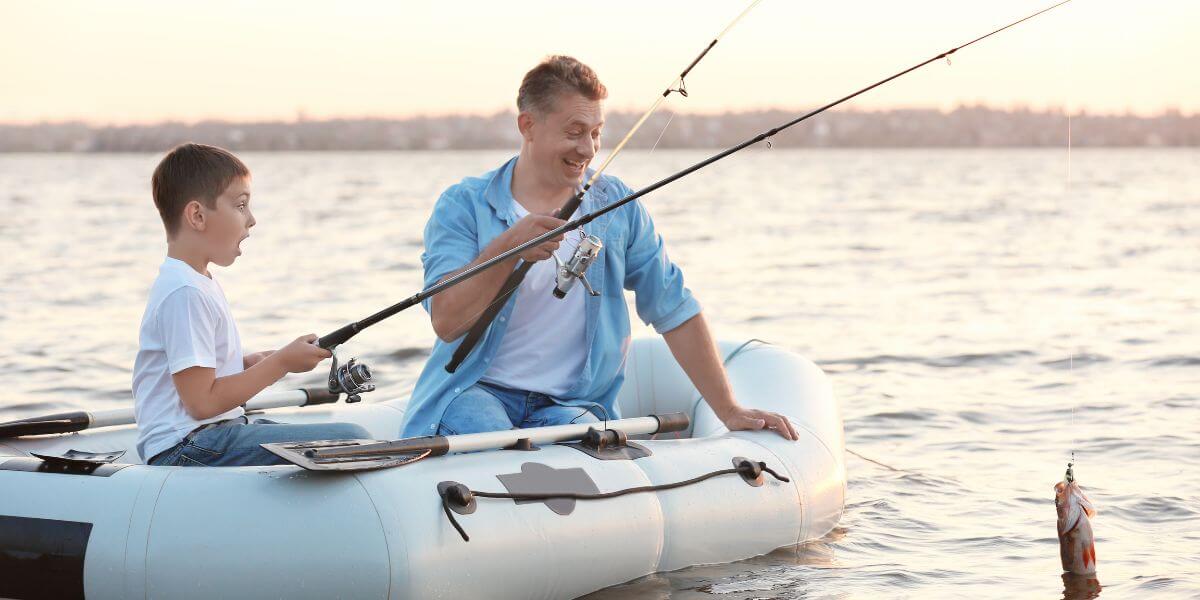
However, it’s not always that simple. Do you need to arrange a license for your boat, and how often do you need to renew it?
Let’s take a look.
Do You Need A License For An Inflatable Boat?
Depending on where you live, you may need to get a license for your inflatable boat. It varies state-by-state, and depends on a number of factors. Generally, if the boat has a motor, it will likely need a license.
Other factors include the size of its engine, the length of the boat, the inflatable boat’s speed, the type of fish caught, the purpose of fishing, the age of the angler, and how far from the shore the fishing takes place.
That’s a lot of potential things to consider! But the rules in some states are very strict, and being caught fishing on an unlicensed boat can get you in some serious trouble. So it’s important that you read the guidelines for where you live.
And if you plan to travel with your boat for a fishing vacation, make sure you also read the regulations for your destination too.
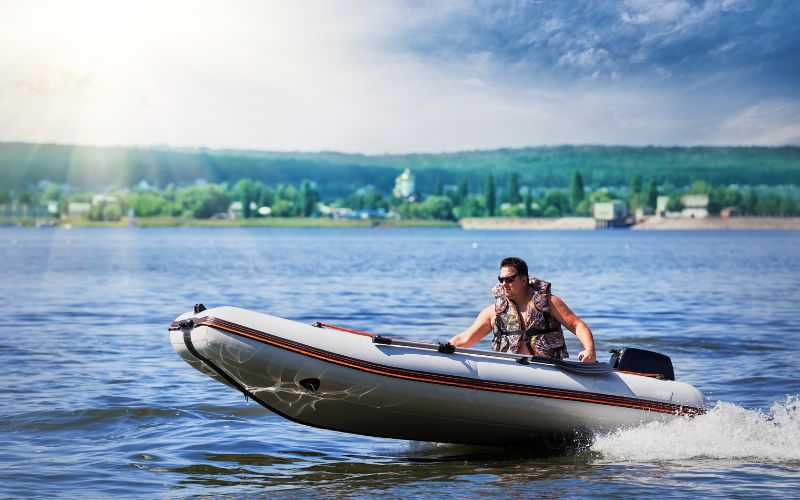
Factors That Determine the Licensing of An Inflatable Fishing Boat
The reason that fishing boats are often licensed is to make sure that the angler is safe to sail a boat, and that the fishing activity is monitored.
Usually, you need to go through a boat safety course before you can get your license, so that you can demonstrate that you can operate a boat safely and that you understand what you are permitted to do.
You can use this tool to check which states have boating laws, and find links to the relevant legislation.
In some states, licensing isn’t mandatory unless the nature of the inflatable boat and the type of fishing are relatively high risk. States determine whether an inflatable fishing boat needs to be licensed using the following factors.
1. The Propulsion Method of The Boat
In most states, licensing isn’t mandatory for manual inflatable boats that you row. However, if the boat is powered by a motor, you would be required to obtain a license for it.
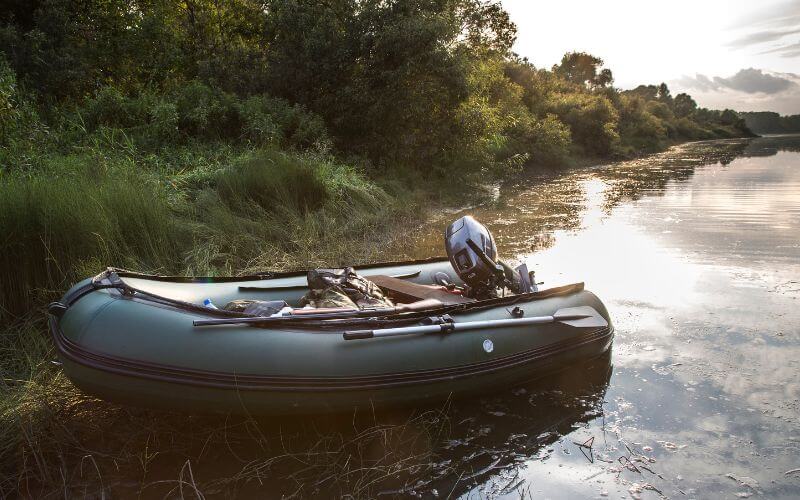
2. The Length and Size of The Inflatable Fishing Boat
In most cases, longer and bigger boats are more likely to require a license than a shorter, smaller boat. The length limit depends on a specific state’s requirements, although 10 feet long is the most common limit. Thus, you may not be required to obtain a license if your boat is less than 10 feet long.
Suggested read: What Is Required On A 12-Foot Inflatable Dinghy?
3. The Speed of The Boat
If the boat is slow, it may not be mandatory to obtain a license for it. The faster the boat, the more experienced the sailor should be. In most states you’ll need a license for any boat that’s capable of travelling at 10 knots or faster.
4. The Type of Fish You Intend to Catch
A license is required for species of fish that are rare to find. This helps to regulate their population and avoid the risk of extinction. In various states, catching regular fish does not necessarily require you to obtain a license.
5. The Purpose of Fishing
Usually, fishing for fun is not licensable in many states. However, if the motive is to sell the fish, then a license may be mandatory. This is to keep track of the revenue acquired through fishing and to regulate the stock of fish that people can catch.
6. The Distance From the Shore
If you’re sailing on the ocean, then the further out you sail, the more dangerous it becomes. Different states have different safe zones where the distance from the sea is concerned.
For instance, it is 9 nautical miles in Florida and Texas. Thus, if you intend to go fishing beyond this point, you would need a license for your boat.
7. The Age of the Angler
Younger anglers may need to get a license because the government views younger people as being less experienced and therefore need to prove they can safely operate a boat. In some states, the minimum age is as young as 13, though many only offer licenses to those ages 16 or over.
Why Are Licences Issued for Inflatable Fishing Boats?
There are a few reasons that licenses are issued for inflatable fishing boats:
1. Improving Safety at Sea
The sea is a dangerous place for any type of activity. Issuing licenses ensures that the anglers are trained for certain situations, and are aware of the rules and regulations pertaining to fishing in different water bodies. In theory, licensing should bring down the number of angling-related casualties, provided people remember their training.
2. Regulating Fishing Activities
Licensing fishing boats allows authorities to detect and deal with people practising illegal, unregulated and unreported fishing. In countries and states where fishing is an economic activity, it’s an important source of revenue. So the authorities want to keep track of the numbers of fish caught to avoid overfishing and to protect the industry.
3. Protecting the Environment
Some fish species are becoming more rare. Licensing for fishing helps to make sure that these species aren’t overfished. Also, licensing ensures that anglers are aware of the consequences of littering in the sea.
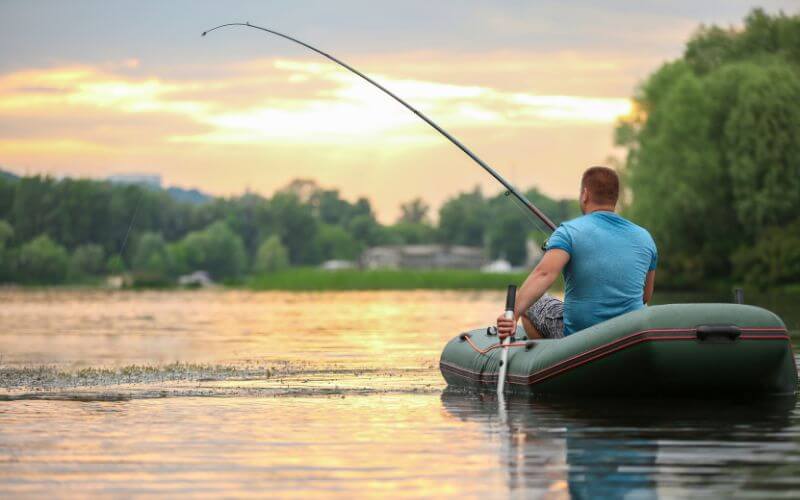
How To Obtain a Licence for An Inflatable Fishing Boat?
To get a boating license, you need to research the requirements for your state. Then, book yourself onto a boating safety and education course – either in-person or online. Pass the test at the end of the course and you can then apply (and pay) for your license.
A boat license is normally viable for one to three years, depending on the type of license that you decide to purchase. It’s a good idea to renew it as soon as it expires if you want to keep fishing – you can do so online, in person or via mail services, so it’s not difficult.
Apart from safety, an inflatable fishing boat license stipulates where you can fish, what species of fish you are allowed to catch, and the limit for the stocks you can fish. In other words, the licensing system controls fishing opportunities to ensure they stay within quota limits.
In some states, fishing without a license will attract different forms of punishment. You may get prosecuted, fined, or banned entirely from fishing activities. Furthermore, the authorities may even confiscate your fishing gear to deter you from fishing.
Note that before you obtain a license, your inflatable fishing boat must be registered in your state.
How To Register An Inflatable Fishing Boat
Before you can acquire a license for your inflatable fishing boat, you have to register the vessel. Different states have different regulations concerning the registration of an inflatable fishing boat. However, the basic details that you should provide remain the same.
They include proof of ownership, detailed information on the boat like the make and model, detailed information on the owner, and in some cases, your driver’s license. You’ll have to pay registration fees set by the state authorities as well.
In most states, registering an inflatable fishing boat can be done online or via the mail. Registration is renewed annually in most states at a small fee, often about $20.
While inflatable fishing boat registration rules differ from state to state, most use the same considerations to determine whether the vessel needs registration. These considerations include:
- The inflatable boat’s propelling power – motor or manual.
- The length of the inflatable fishing boat.
- Where you plan to carry out your fishing activities: private waters or government waters.
In almost all states, boats that are propelled by a motor are always registered.
States such as Washington DC are so stringent that they require registration for all inflatable fishing boats, even those not powered by motors. This shows why it’s important that you check your local regulations.
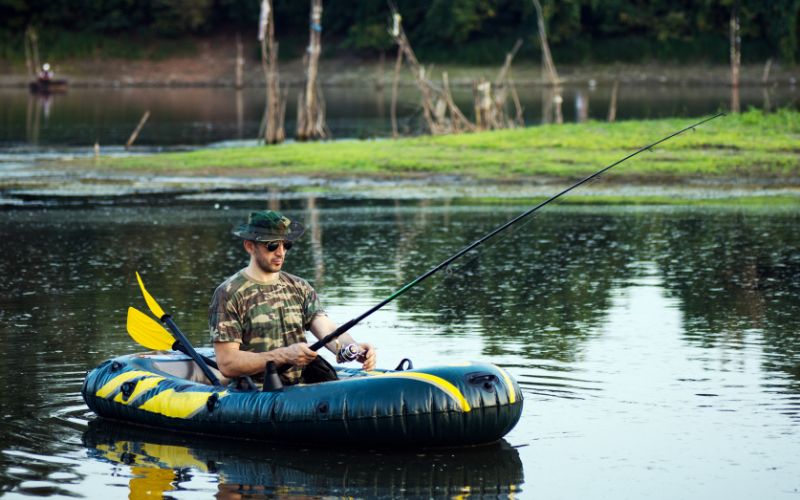
Frequently Asked Questions
If you don’t license your fishing boat in a state that requires it, you’re breaking the law and you could be prosecuted. Licensing also makes sure you’re up to date with the best safety information for fishing on open waters.
Requirements vary from state to state. The first requirement is that your boat should be registered with the state. You’ll then need to take a safety course, pass a test at the end of the course, and pay a fee for your license.
There are different ways through which you can be punished for using an inflatable fishing boat without a license. You could face prosecution, a fine, or confiscation of your fishing gear.
Final Thoughts
Whether or not your inflatable fishing boat needs to be licensed will depend on the state in which you live, or where you intend to fish. Each state has rules and regulations regarding the process of obtaining a license – some states don’t even require you to obtain a license for your fishing vessel at all.
Make sure you always check the regulations before you head out. If your fishing trip is interrupted by patrolling officials who ask to see your license, and you can’t produce one, you could get into a lot of trouble.

